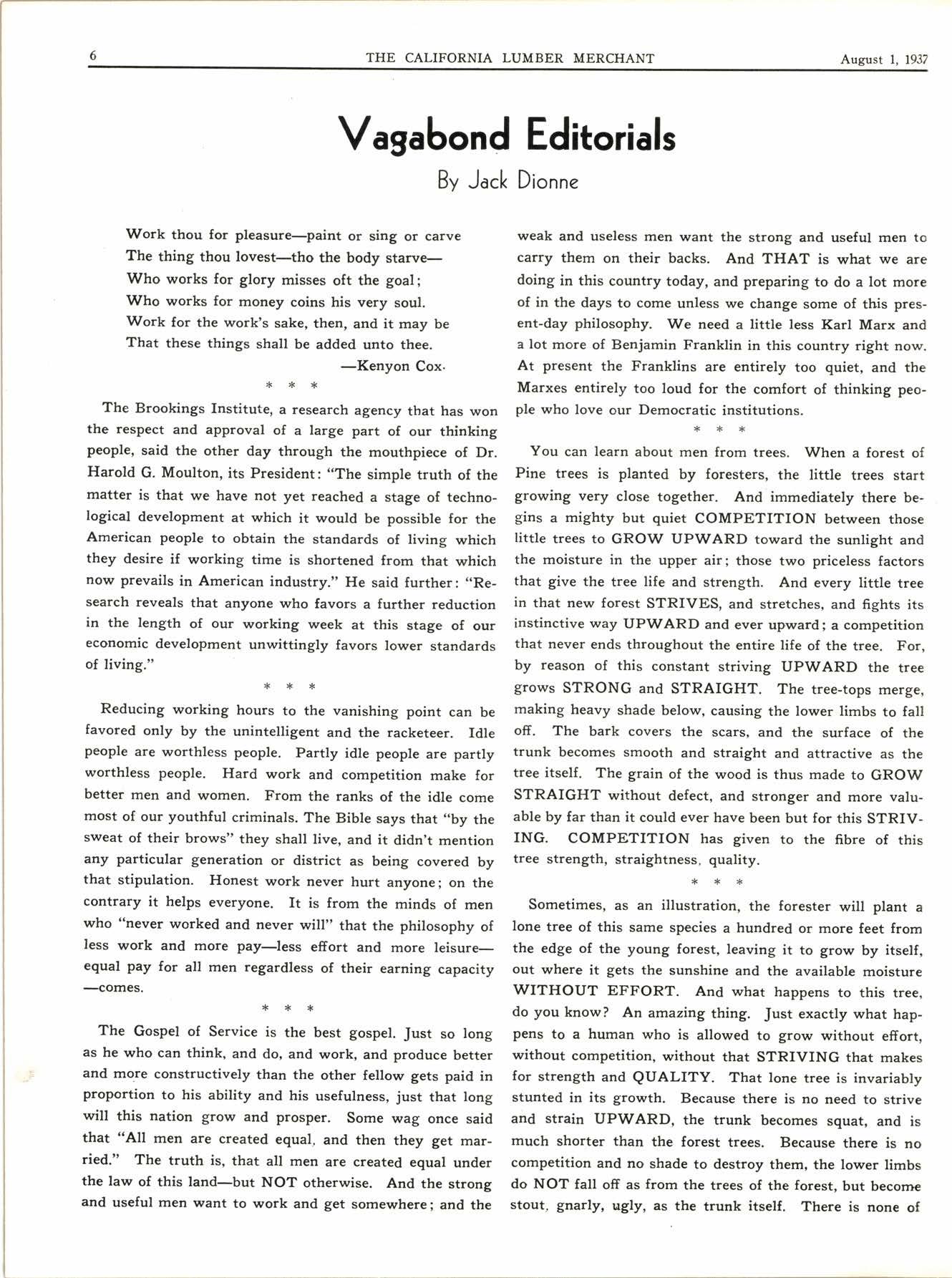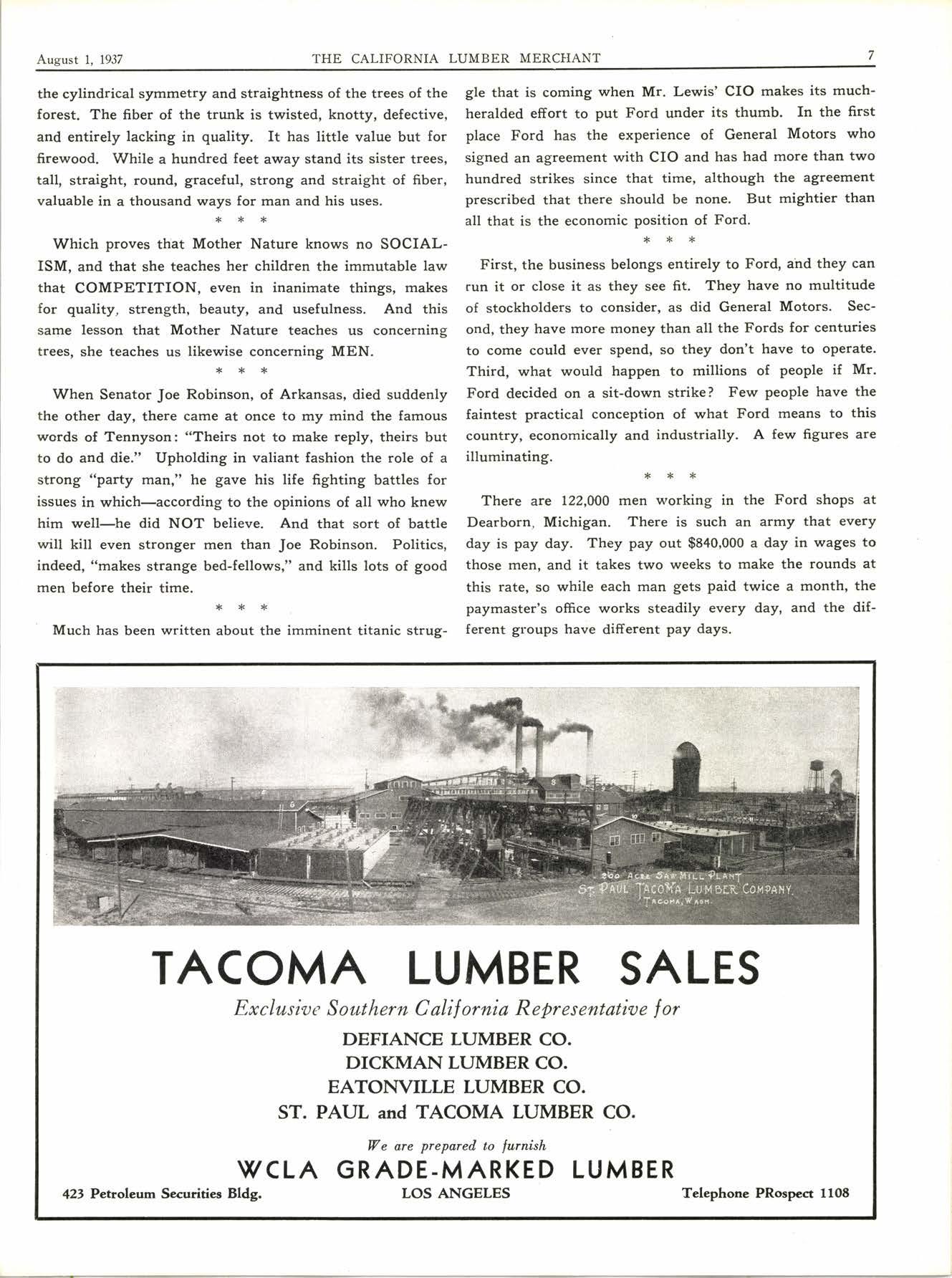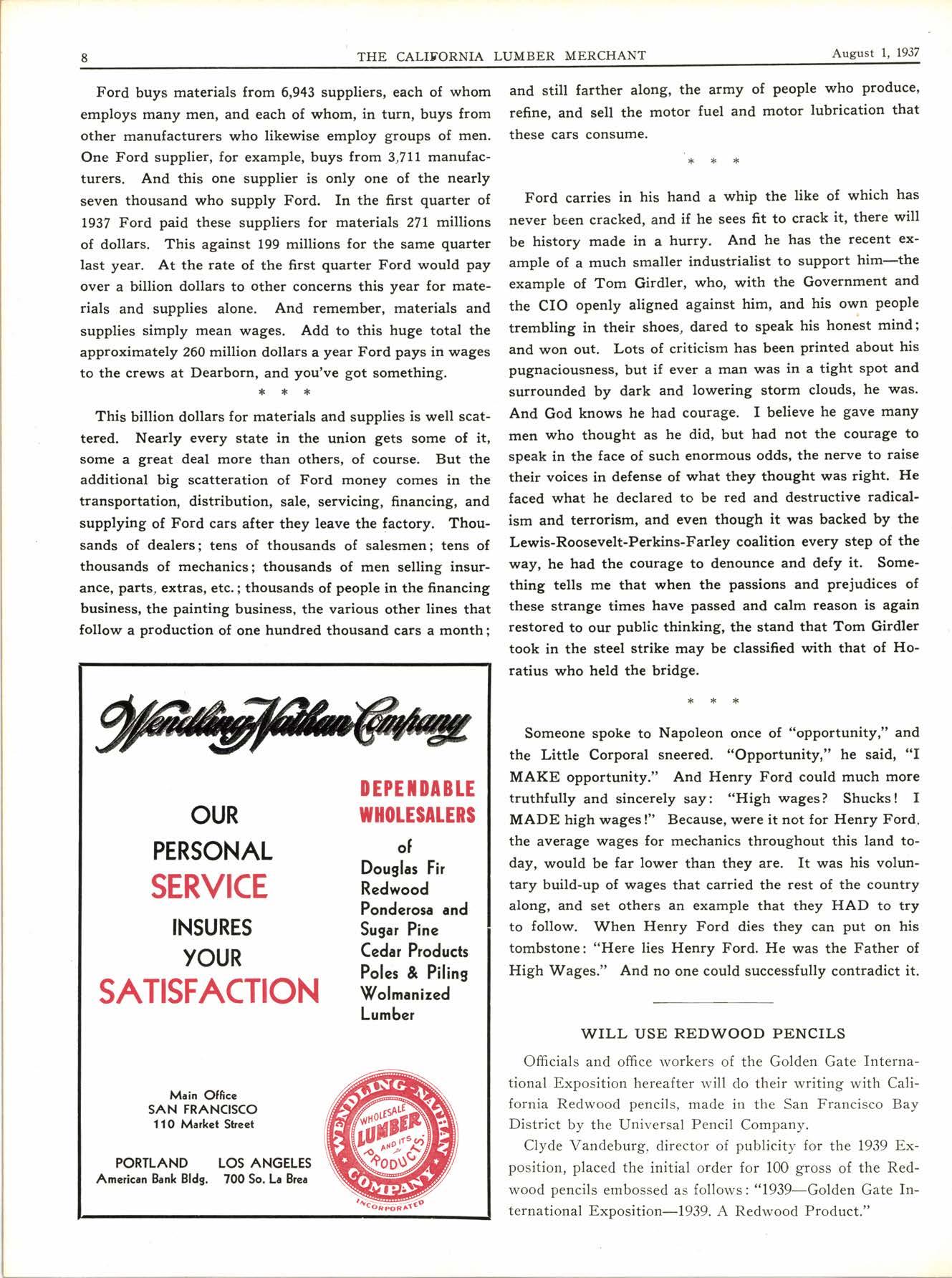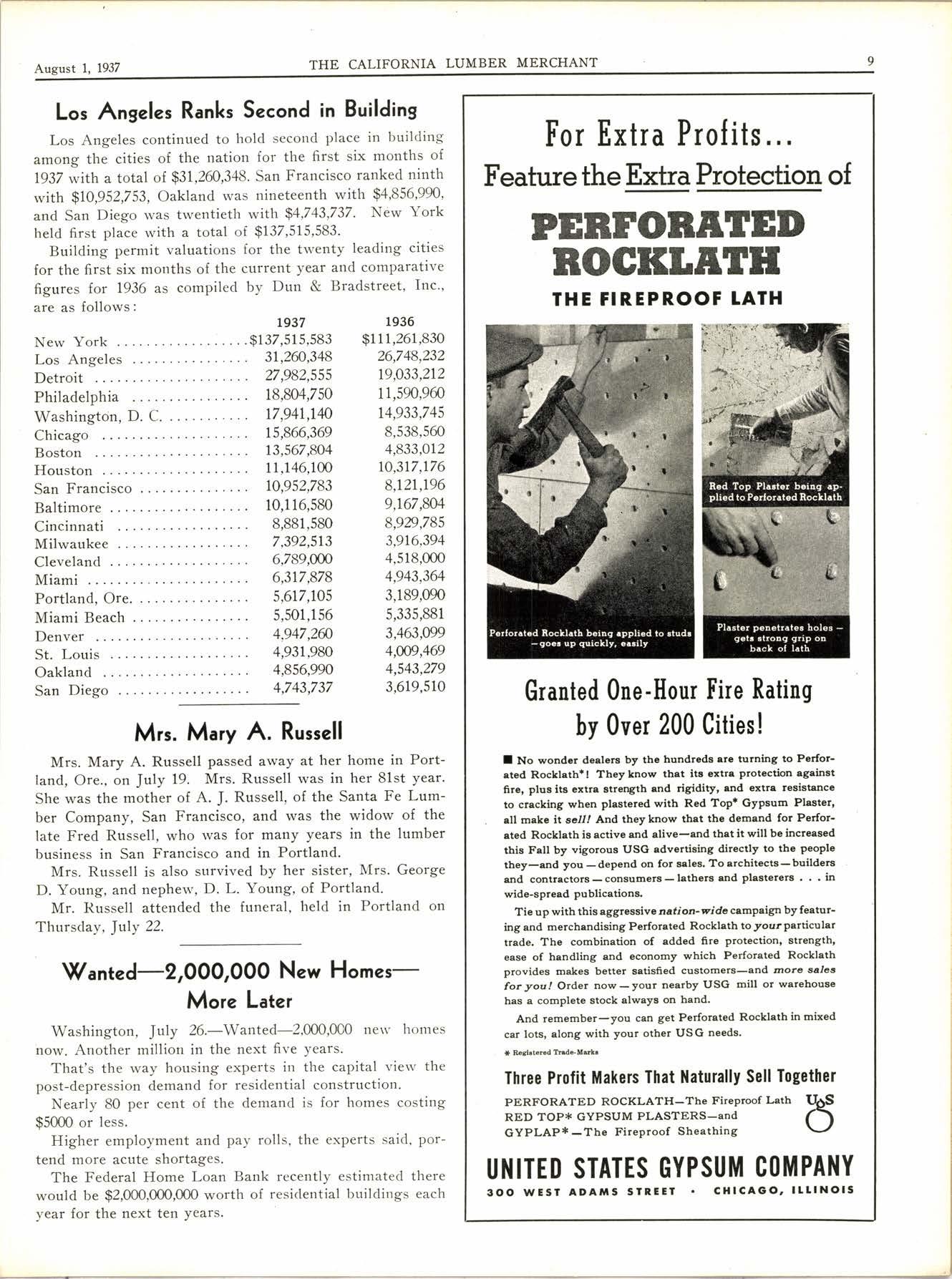
10 minute read
Vagabond Editorials
By Jack Dionne
Work thou for pleasure-paint or sing or carve
The thing thou lovest-tho the body starveWho works for glory misses oft the goal; Who works for money coins his very soul. Work for the work's sake, then, and it may be That these things shall be added unto thee.
-Kenyon Cox. ***
The Brookings Institute, a research agency that has won the respect and approval of a large part of our thinking people, said the other day through the mouthpiece of Dr. Harold G. Moulton, its President: "The simple truth of the matter is that we have not yet reached a stage of technoIogical development at which it would be possible for the American people to obtain the standards of living which they desire if working time is shortened from that which now prevails in American industry." He said further: f,Research reveals that anyone who favors a further reduction in the length of our working week at this stage of our economic development unwittingly favors lower standards of living."
Reducing working nr"* ; tl" *,"rirt ing point can be favored only by the unintelligent and the racketeer. Idle people are worthless people. Partly idle people are partly worthless people. Hard work and competition make for better men and women. From the ranks of the idle come most of our youthful criminals. The Bible says that .,by the sweat of their brows" they shall live, and it didn't mention any particular generation or district as being covered by that stipulation. Honest work never hurt anyone; on the contrary it helps everyone. It is from the minds of men who "never worked and never will" that the philosophy of less work and more pay-less effort and more leisureequal pay for all men regardless of their earning capacity -comes. *rf*
The Gospel of Service is the best gospel. Just so long as he who can think, and do, and work, and produce better and more constructively than the other fellow gets paid in proportion to his ability and his usefulness, just that long will this nation grow and prosper. Some wag once said that "All men are created equal, and then they get married." The truth is, that all men are created equal under the law of this land-but NOT otherwise. And the strong and useful men want to work and get somewhere; and the weak and useless men want the strong and useful men to carry them on their backs. And THAT is what we are doing in this country today, and preparing to do a lot more of in the days to come unless we change'some of this present-day philosophy. We need a little less Karl Marx and a lot more of Benjamin Franklin in this country right now. At present the Franklins are entirely too quiet, and the Marxes entirely too loud for the comfort of thinking people who love our Democratic institutions.
You can learn about -"" O"* ,*"". When a forest of Pine trees is planted by foresters, the little trees start growing very close together. And immediately there begins a mighty but quiet COMPETITION between those little trees to GROW UPWARD toward the sunlight and the moisture in the upper air; those two priceless factors that give the tree life and strength. And every little tree in that new forest STRMS, and stretches, and fights its instinctive way UPWARD and ever upward; a competition that never ends throughout the entire life of the tree. For, by reason of this constant striving UPWARD the tree grows STRONG and STRAIGHT. The tree-tops merge, making heavy shade below, causing the lower limbs to fall off. The bark covers the scars, and the surface of the trunk becomes smooth and straight and attractive as the tree itself. The grain of the wood is thus made to GROW STRAIGHT without defect, and stronger and more valuable by far than it could ever have been but for this STRIVING. COMPETITION has given to the fibre of this tree strength, straightness, quality.
Sometimes, as an illustration, the forester will plant a lone tree of this same species a hundred or more feet from the edge of the'young forest, leaving it to grow by itself, out where it gets the sunshine and the available moisture WITHOUT EFFORT. And what happens to this tree, do you know? An amazing thing. Just exactly what happens to a human who is allowed to grow without efiort, without competition, without that STRIVING that makes for strength and QUALITY. That lone tree is invariably stunted in its growth. Because there is no need to strive and strain UPWARD, the trunk becomes squat, and is much shorter than the forest trees. Because there is no competition and no shade to destroy them, the lower limbs do NOT fall off as from the trees of the forest, but become stout, gnarly, ugly, as the trunk itself. There is none of the cylindrical symmetry and straightness of the trees of the forest. The fiber of the trunk is twisted, knotty, defective, and entirely lacking in quality. It has little value but for firewood. While a hundred feet away stand its sister trees, tall, straight, round, graceful, strong and straight of fiber, valuable in a thousand ways for man and his uses.
*>F*
Which proves that Mother Nature knows no SOCIALISM, and that she teaches her children the immutable law that COMPETITION, even in inanimate things, makes for quality, strength, beauty, and usefulness. And this same lesson that Mother Nature teaches us concerning trees, she teaches us likewise concerning MEN.
**:N< t>k*
When Senator Joe Robinson, of Arkansas, died suddenly the other day, there came at once to my mind the famous words of Tennyson: "Theirs not to make reply, theirs but to do and die." Upholding in valiant fashion the role of a strong "party man," he gave his life fighting battles for issues in which-according to the opinions of all who knew him well-he did NOT believe. And that sort of battle will kill even stronger men than Joe Robinson. Politics, indeed, "makes strange bed-fellows," and kills lots of good men before their time.
Much has been written about the imminent titanic strug- gle that is coming when Mr. Lewis' CIO makes its muchheralded effort to put Ford under its thumb. In the first place Ford has the experience of General Motors who signed an agreement with CIO and has had more than two hundred strikes since that time, although the agreemEnt prescribed that there should be none. But mightier than all that is the economic position of Ford.

8>t*
First, the business belongs entirely to Ford, ahd they can run it or close it as they see fit. They have no multitude of stockholders to consider, as did General Motors. Second, they have more money than all the Fords for centuries to come could ever spend, so they don't have to operate. Third, what would happen to millions of people if Mr. Ford decided on a sit-down strike? Few people have the faintest practical conception of what Ford means to this country, economically and industrially. A few figures are illuminating. ***
There are 122,000 men working in the Ford shops at Dearborn, Michigan. There is such an army that every day is pay day. They pay out $840,000 a day in wages to those men, and it takes two weeks to make the rounds at this rate, so while each man gets paid twice a month, the paymaster's office works steadily every day, and the different groups have different pay days.
Ford buys materials from 6,943 suppliers, each of whom employs many men, and each of whom, in turn, buys from other manufacturers who likewise employ groups of men. One Ford supplier, for example, buys from 3,711 manufacturers. And this one supplier is only one of the nearly seven thousand who supply Ford. In the first guarter of 1937 Ford paid these suppliers for materials 27L millions of dollars. This against 199 millions for the same quarter last year. At the rate of the first quarter Ford would pay over a billion dollars to other concerns this year for materials and supplies alone. And remember, materials and supplies simply mean wages. Add to this huge total the approximately 26O million dollars a year Ford pays in wages to the crews at Dearborn, and you've got something.

***
This billion dollars for materials and supplies is well scattered. Nearly every state in the union gets some of it, some a great deal more than others, of course. But the additional big scatteration of Ford money comes in the transportation, distribution, sale, servicing, financing, and supplying of Ford cars after they leave the factory. Thousands of dealers; tens of thousands of salesmen; tens of thousands of mechanics; thousands of men selling insurance, parts, extras, etc.; thousands of people in the financing business, the painting business, the various other lines that follow a production of one hundred thousand cars a month; and still farther along, the army of people who produce, refine, and sell the motor fuel and motor lubrication that these cars consume.
**,k
Ford carries in his hand a whip the like of which has never been cracked, and if he sees fit to crack it, there will be history made in a hurry. And he has the recent example of a much smaller industrialist to support him-the example of Tom Girdler, who, with the Government and the CIO openly aligned against him, and his own people trembling in their shoes, dared to speak his honest mind; and won out. Lots of criticism has been printed about his pugnaciousness, but if ever a man was in a tight spot and surrounded by dark and lowering storm clouds, he was. And God knows he had courage. I believe he gave many men who thought as he did, but had not the courage to speak in the face of such enormous odds, the nerve to raise their voices in defense of what they thought was right. He faced what he declared to be red and destructive radicalism and terrorism, and even though it was backed by the Lewis-Roosevelt-Perkins-Farley coalition every step of the way, he had the courage to denounce and defy it. Something tells me that when the passions and prejudices of these strange times have passed and calm reason is again restored to our public thinking, the stand that Tom Girdler took in the steel strike may be classified with that of Horatius who held the bridge.
Someone spoke a ""n"r""" r"""* "opportunity," and the Little Corporal sneered. "Opportunity," he said, "I MAKE opportunity." And Henry Ford could much more truthfully and sincerely say: "High wages? Shucks! I MADE high wages !" Because, were it not for Henry Ford, the average wages for mechanics throughout this land today, would be far lower than they are. It was his voluntary build-up of wages that carried the rest of the country along, and set others an example that they HAD to try to follow. When Henry Ford dies they can put on his tombstone: "Here lies Henry Ford. He was the Father of High Wages." And no one could successfully contradict it.
Will Use Redwood Pencils
Ofiflcials and office rvorkers of the Golden Gate International Exposition hereafter will do their writing with California Redwood pencils, made in the San Francisco Bay District by the lJniversal Pencil Company.
Clyde Vandeburg, director of publicity for the 1939 Exposition, placed the initial order for 100 gross of the Redwood pencils embossed as follows: "1939-Golden Gate International Exposition-l939. A Redwood Product."
Los Angeles Ranks Second in Building
Los Angeles continued to hold secoud place in building among the cities of the rration for the first six months of 1937 with a total of $31,26O,348' San Francisco ranked ninth rvith $10,952,753, Oakland was nineteenth with $4,856,990, and San Diego was twentieth with $4,743,737- New York l'reld first place with a total of $137,515,583Building permit valuations for the trventy leading cities for the first six months of the current year and comparative figures for 1936 as compiled by Dun & Bradstreet, Inc', are as follows:

For Extra Prolits,.. Feature the Extra Protection of PENTONATED NOGKI.ATH
Mrs. Mary A. Rutsell
Mrs. Mary A. Russell passed away at her home in Portland, Ore., on July 19. Mrs. Russell was in her 81st year. She was the mother of A. J. Russell, of the Santa Fe Lumber Company, San Francisco, and was the widow of the late Fred Russell, who rvas for many years in the lumber business in San Francisco and in Portland.
Mrs. Russell is also survived by her sister, Mrs. George D. Young, and nephew, D. L. Young, of Portland.
Mr. Russell attended the funeral, held in Portland on Thursday, Jaly 22.
\(/anted-2,000,000 New HomesMore Later
Washington, July 26.-Wanted-2,000,000 nerv homes now. Another milliorr in the next five years.
That's the way housing experts in the capital view the post-depression demand for residential construction.
Nearly 80 per cent of the demand is for homes costing $5000 or less.
Higher employment and pay rolls, the experts said, portend more acute shortages.
The Federal Home Loan Bank recentty estimated there would be $2,000,000,000 worth o{ resiclential buildings each year for the next ten years'
Granted One-Hour ['ire Rating by 0ver 200 Cities !
I No wondcr dealers by the hundreds are turning to P€rforgted Roclleth*t Theyknow thet its €xtra Protection against frre, ptus ite cxtra otrength end rigidity' end extrs reaiatance to cracking when pleotered with Red Topr Gypsum Plaeter, all make it sc/I/ And they know thst the demand for Perforated Rocklath is ective snd alive-and that it will be increesed thiE Fall by vigorous USG advertieing directly to the peoPle they-and you -depend on for asles. To architects-builders and contrectors-coDsumers-lathers and plaeterera - in wide-spread publications.
Tie up with this aggressive na tion-widc campaigl by featuring and merchandising Perforated Rocklath to yourparticular trade. The combination of added 6re protection' atrengtht ease of handling and economy which Perforated Rocklath provides makes better satisfied cuatomera-and mora sa,lcs fotyou! Order now-your nearby USG mill ot warehouse has a complete stock alwayE on hand.
And remember-you can get Perforated Rocklath in mixed car lots, along with your other USG needs.
* Rosr.h!.d Tnd.-Urtr
Three Profit Makers That llaturally Sell Together
PERFORATED ROCKLATH-The Fireproof Lath RED TOP* GYPSUM PLASTERS-and GYPLAP* -Tbe Fireproof Sheathing










